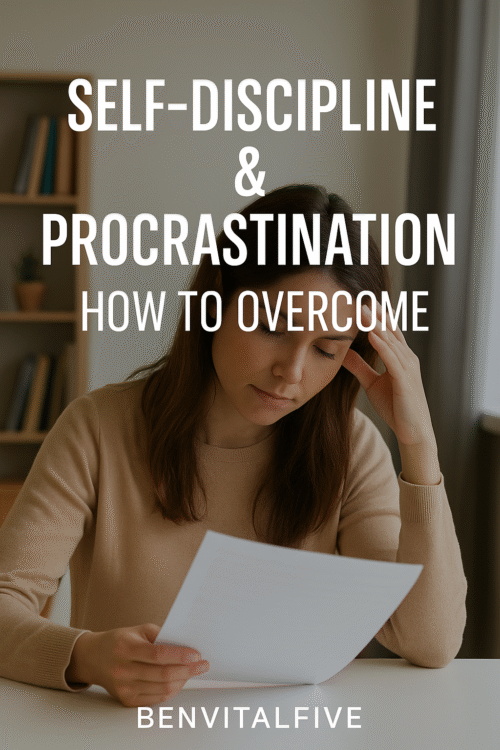Table of Contents
ToggleIntroduction.
Self-discipline and procrastination. Two words we hear often. One feels heavy, the other feels sneaky. Procrastination steals your time. Self-discipline gives it back. And the truth is… they’re always in a tug of war inside our minds.
I know because I’ve lived it. There were days I told myself “I’ll start tomorrow.” Tomorrow became next week. Tasks piled up. Stress grew. And then I realized something. Procrastination wasn’t about laziness. It was about avoiding discomfort. About chasing quick rewards instead of long-term wins.
That’s when I learned discipline. Not all at once. Not like flipping a switch. But slowly, in small steps. Let me walk you through what worked.
Why We Procrastinate
Most people think procrastination is just being lazy. But it’s not. It’s deeper. Sometimes it’s fear—fear of failing. Sometimes it’s perfectionism—we wait for the “right moment.” And sometimes it’s plain overwhelm—the task feels too big, so we escape.
Research by the American Psychological Association on procrastination explains that it’s often tied to stress, avoidance, and even mental health—not laziness.
Science also shows our brains crave instant gratification. Quick rewards like scrolling social media or watching videos release dopamine. Meanwhile, long-term tasks feel boring or stressful. That’s how procrastination tricks us into delaying.
How Self-Discipline Breaks the Cycle
Think of self-discipline as a muscle. Weak at first. Stronger with training. Each time you choose focus over distraction, the muscle grows.
Self-discipline doesn’t mean punishing yourself. It means choosing what matters most. Saying “yes” to the long game. Research from Harvard Health on motivation shows that habits and discipline create consistency long after motivation fades.
When you build discipline, procrastination loses its grip.
If you struggle with both, here’s how to learn how self-discipline fights procrastination in daily life.
Strategies to Build Self-Discipline and Overcome Procrastination
Here are simple ways that worked for me—and they can work for you too.
Start with 5 Minutes
Tell yourself, “I’ll just do this for 5 minutes.” Most times, once you start, momentum carries you.
Write Clear Goals
Vague goals create vague results. Use the SMART method. For example: “I’ll walk 15 minutes after lunch.”
Kill Distractions
Create a focused space. Turn off notifications. Productivity experts recommend time blocking techniques explained by Healthline.
�� Affiliate Suggestion: Noise-cancelling headphones for focus during work or meditation.
Use Time Blocking
Work in 25-minute bursts (Pomodoro technique). Rest for 5 minutes. By the third round, you’ll be in flow.
Build Routines
Routine is stronger than motivation. Pair habits together—like journaling before bed. Research from the NIH on small habits shows that small, repeated actions lead to long-term change.
Reward Progress
Finished a week of workouts? Treat yourself to something small. Progress needs celebration.
Affiliate Suggestion: Wellness journals and habit trackers make it easier to track wins.
Learn to Say No
Self-discipline also means protecting your time. Say no to what doesn’t serve your bigger goals.
Mindset Shifts That Help
Your mindset profoundly influences your habits.
- Done is better than perfect. Perfection delays progress.
Embracing the notion that “done is better than perfect” fosters progress, as the pursuit of perfection often hinders advancement.
- Focus on your why. When goals are personal, motivation feels easie
Cultivate a focus on your underlying motivations. When goals resonate on a personal level, sustaining motivation becomes significantly more attainable.
- Be kind to yourself. Missing a day doesn’t erase progress. Reset and move again
Practice self-compassion. Neglecting a day does not negate your progress; instead, take the opportunity to reset and recommence your journey with renewed vigor. “`.
The Mayo Clinic’s guide on building lasting habits confirms that kindness and consistency matter more than punishment.
Tools That Support Discipline
- Apps: Habitica, Calm, MyFitnessPal.
- Books: Atomic Habits (James Clear), Deep Work (Cal Newport).
- Planners: Daily habit trackers.
- Support: An accountability buddy.
For extra balance, check out morning nutrition tips for lasting energy. Nutrition fuels discipline too.
A Small Story
Last year, I struggled with finishing a project. Deadlines passed. Stress piled up. I told myself, “I’ll start tomorrow.” Tomorrow came and went. Finally, I tried something different. Just 5 minutes a day. No pressure.
The project grew little by little. A page turned into chapters. Chapters into a finished draft. That’s when I realized—discipline isn’t about giant leaps. It’s about small, steady steps.
Conclusion
Procrastination steals time. Self-discipline gives it back. Start small. Build habits. Celebrate progress.
Challenges will come. Motivation will fade. But with discipline, you keep moving. And that’s how you win the tug of war between procrastination and progress.
FAQ
Q1: Is procrastination laziness?
No. As the APA on procrastination explains, it’s often tied to fear and stress.
Q2: How long does it take to build discipline?
Like a muscle, it grows with consistent effort—weeks to months.
Q3: What’s the fastest way to beat procrastination?
Start with small steps. The 5-minute rule often breaks resistance.
Q4: Can anyone learn discipline?
Yes. According to Harvard’s insights on motivation, self-discipline improves with practice.



